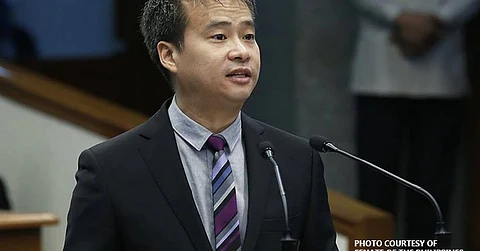
- NEWS
- the EDIT
- COMMENTARY
- BUSINESS
- LIFE
- SHOW
- ACTION
- GLOBAL GOALS
- SNAPS
- DYARYO TIRADA
- MORE

The enactment of a law putting in place policies for the protection of rights and welfare of caregivers would also provide safety nets to Overseas Filipino Workers employed in similar industries abroad, Senate Majority Joel Villanueva said Friday.
After years of deliberation in Congress, Villanueva hailed President Ferdinand R. Marcos Jr.'s decision to sign into law the Republic Act 11965, or An Act Institutionalizing Policies for the Protection and Welfare of Caregivers in the Practice of their Occupation on 23 November, which sets policies aimed at protecting the rights and welfare of domestic caregivers.
"As we recognize the important role of our caregivers in national development, we must ensure they are protected against abuse, harassment, and economic exploitation," Villanueva said
RA 11965 adheres to a policy of protecting caregivers against abuse, harassment, violence, and economic exploitation.
Before it finally became a law, Villanueva pitched several amendments incorporated to further strengthen the measure.
Among these key proposals is the emphasis on the caregiver's legal age when entering the job—which must be at least 18 years old, in consideration of all forms of abuse and exploitation against children.
"These include the prevention of child labor as well as debt bondage, like caregiving services in exchange for tuition or living arrangements," said Villanueva.
Also, the lawmaker added that the policy aligns well with the current requirements of the Technical Education and Skills Development Authority for prospective trainees of Caregiving Courses— at least having a high school diploma.
The newly signed Caregiver's Welfare Act covers individuals employed and working within the country in private homes, nursing or care facilities, and other residential settings, and caregivers whether directly hired by the employer or placed through the Public Employment Services Office and Private Employment Agency.
The law mandates that the caregivers' working hours will be based on their employment contract and in accordance with labor laws, rules, and regulations.
Caregivers will be entitled to overtime pay for work beyond the daily eight working hours, and a night shift differential with a minimum wage not less than the applicable minimum wage in the region, with their salaries be paid on time once every two weeks or twice a month at intervals not exceeding 16 days.
Those who have rendered at least one month of service are also entitled to a 13th month pay, which will be paid not later than 24 December of every year, or upon separation from employment.
Caregivers are also entitled to a leave credit of at least five days with pay for those who have rendered at least one year of service.
The law mandates benefits for the caregivers such as contributions to the Social Security System, the Philippine Health Insurance Corp., and the Home Development Fund.
A caregiver suffering from verbal or emotional abuse, inhumane treatment, and physical abuse may terminate the contract at any time before its expiration.
While the Department of Labor and Employment is tasked to promulgate the Implementing Rules and Regulations of the Caregiver Act, in coordination with the Technical Education and Skills Development Authority and other concerned agencies for the effective implementation of the law.
Under the law, the Department of Migrant Workers, in coordination with the DOLE, TESDA, and other agencies, is likewise mandated to issue the rules and regulations for the recruitment and deployment of Filipino caregivers for overseas employment to ensure their protection, including their reintegration.
The RA 11966 takes effect 15 days upon publication in the Official Gazette or at least two newspapers of general circulation.
